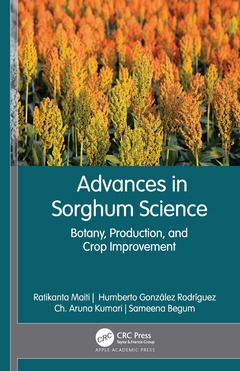Description
Advances in Sorghum Science
Botany, Production, and Crop Improvement
Coordinators: Maiti Ratikanta, Rodríguez Humberto González, Kumar Ch. Aruna, Begum Sameena
Language: English
Subjects for Advances in Sorghum Science:
Keywords
Sweet Sorghum; Grain Sorghums; Sorghum production; Cad; Sorghum botany; Seed physiology; Sorghum Cultivars; Sorghum crop; Moisture Content; Sorghum ideotypes; Sf; Sorghum Genotypes; Seed Germination; Sorghum Yields; QTL; Sorghum Lines; PHS; SSR Locus; De Wet; Preharvest Sprouting; SSR Marker; 2C DNA Content; Shoot Fly; Aba Content; High Osmotic Adjustment; Anthracnose Resistance; Host Plant Resistance; Post-flowering Stages; IPAR
Publication date: 09-2023
· 15.2x22.9 cm · Paperback
Publication date: 07-2021
· 15.2x22.9 cm · Hardback
Description
/li>Contents
/li>Biography
/li>
This new volume, Advances in Sorghum Science: Botany, Production, and Crop Improvement, provides an easy-to-read and comprehensive treatment of the sorghum crop. With the world?s production of sorghum topping over 55 million tons annually, sorghum is very important for as a staple dietary food for much of the world as a rich source of micronutrients and macronutrients, as an ingredient in the processing of many foods, and as a source of fodder.
The authors of the volume provide detailed information on sorghum from several disciplines and bring together recent literature under one umbrella. The book covers the various aspects of the sorghum crop, starting from its origin, to its domestication, and going on to biotechnology of the crop. It describes sorghum production, ideotypes, botany, physiology, abiotic and biotic factors affecting crop productivity, methods of cultivation, postharvest management, grain quality analysis for food processing, improvement of sorghum crop, and research advancements in breeding and biotechnology.
This valuable resource will be helpful to researchers and scientists working to understand the relation between various disciplines and the implementation of new methods and technology for crop improvement and higher productivity. The multi-pronged approach will help to enable the increase sorghum productivity to meet the world?s growing demands.
1. Background and Importance of Sorghum 2. World Sorghum Production and Factors Affecting Production 3. Origin, Evolution, and Domestication of Sorghum 4. Sorghum Ideotype 5. Sorghum Botany 6. Physiological Basis of Crop Growth and Productivity 7. Research Advances in Abiotic Stress Resistance in Sorghum 8. Biotic Stresses Affecting Crop Productivity 9. Methods of Cultivation in Sorghum 10. Harvest and Postharvest Technology 11. Sorghum Grain Quality Analysis, Food Quality Characteristics, Chemistry and Food Processing 12. Research Advances in Breeding and Biotechnology of Sorghum
Ratikanta Maiti, PhD, DSc, was a world-renowned botanist and crop physiologist. He worked on jute and allied fibers at the former Jute Agricultural Research Institute (ICAR), India, and also worked as a plant physiologist on sorghum and pearl millet at ICRISAT (International Crops Research Institute for the Semi-Arid Tropics) for 10 years. For, he was a professor and research scientist at three different universities in Mexico. He also worked for six years as a Research Advisor at Vibha Seeds, Hyderabad, India, and as a Visiting Research Scientist for five years at the Universidad Autonoma de Nuevo Leon, Facultad de Ciencias Forestales, Nuevo Leon, Mexico Mexico. As the author of more than 40 books and about 500 research papers, he won several international awards, including an Ethno-Botanist Award (USA) sponsored by Friends University, Wichita, Kansas, the United Nations Development Programme; a senior research scientist award offered by Consejo Nacional de Ciencia y Tecnología (CONNACYT), Mexico, and gold medal from India 2008 offered by ABI. He was Chairman of the Ratikanta Maiti Foundation and chief editor of three international journals. Dr. Maiti died in 2019.
Humberto González Rodríguez, PhD, is a faculty member at the Autonomous University of Nuevo Leon, Facultad de Ciencias Forestales (School of Forest Sciences), Nuevo Leon, Mexico. He received his PhD in Plant Physiology from Texas A&M University under the advice of Dr. Wayne R. Jordan and Dr. Malcolm C. Drew. He is currently working on water relations and plant nutrition in native woody trees and shrubs, northeastern Mexico. In addition, his research includes nutrient deposition via litterfall in different forest ecosystems. Dr. Rodríguez teaches chemistry, plant physiology, and statistics.
Ch. Aruna Kumari, PhD, is Assistant Professor in the Department of Crop Physiology at Agricultural College, Jagtial, Professor Jaya Shankar Telanga




